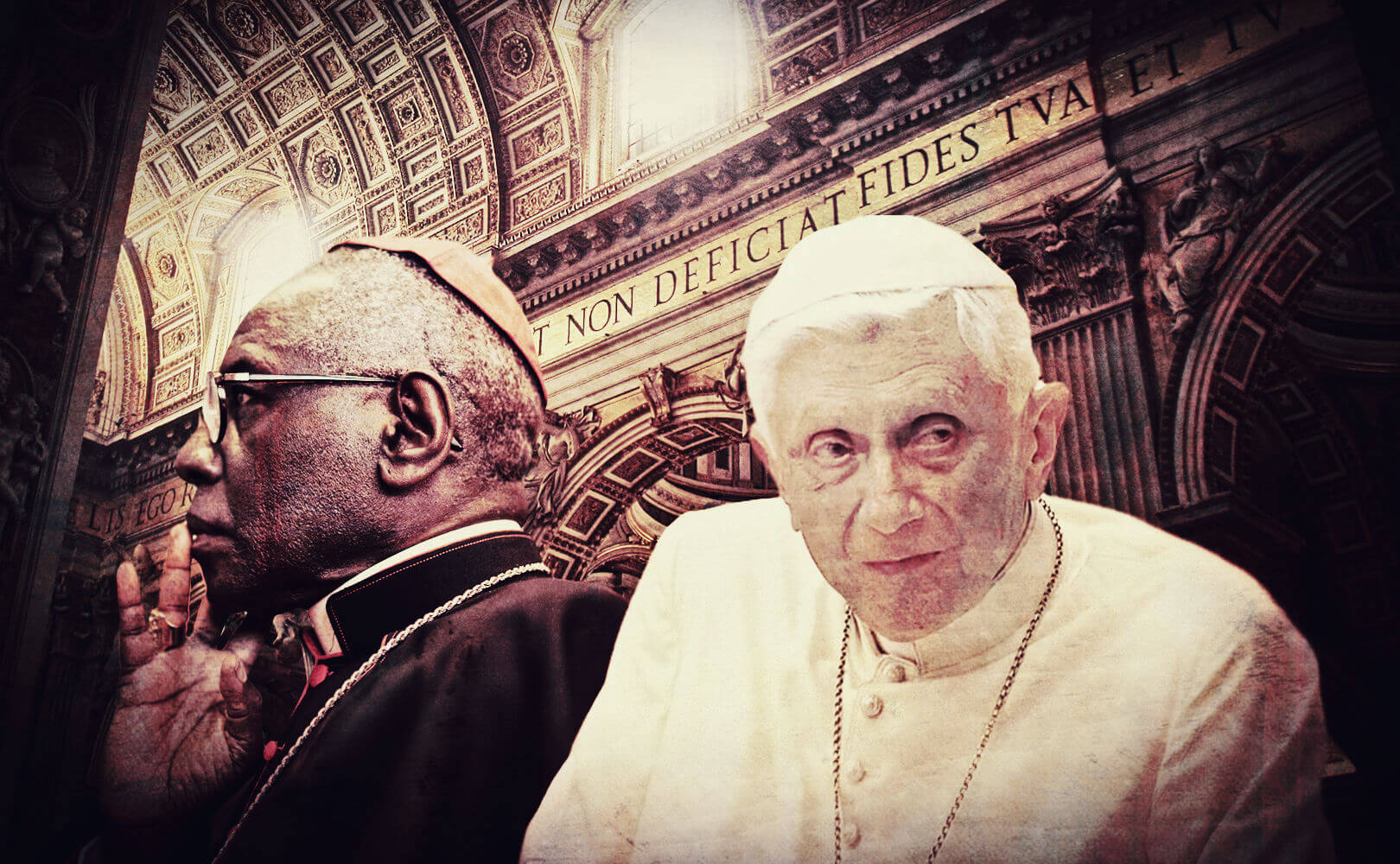By Giuseppe Pellegrino & Steve Skojec
Le Figaro has published a preview today (French language; paywall) of a forthcoming book co-authored by Pope Emeritus Benedict XVI and Cardinal Robert Sarah in support of priestly celibacy, entitled “Des profondeurs de nos cœurs” – “From the Depths of our Hearts,” scheduled to be released on January 15.
The two authors say that in recent months, “as the world echoed the din created by a strange synod of media that took precedence” over the real Amazon synod, they met, and “exchanged ideas and concerns.” They went on to pray and meditate, exchanging letters as they continued their reflections.
So similar were their concerns and findings that the two decided to make their work available to all.
In their joint introduction to the book, they speak with one voice: “Like Augustine we can say: ‘I cannot be silent! I know indeed how pernicious silence would be for me….It is to Christ that I will have to account for the sheep entrusted to my care. I can’t keep quiet or pretend ignorance.”
“We do it in a spirit of love for the unity of the Church,” they write. “If ideology divides, the truth unites hearts.”
Although Benedict has been relatively silent since his abdication, he has spoken at certain moments. His letter last year, addressing the sex abuse crisis, was perhaps his most significant contribution to date. But if these excerpts are any indication, this is the first time he’s spoken out in such a direct manner to confront something that is currently unfolding in the Church since he relinquished his papacy.
Each of the authors wrote their own contribution, written in their own name. They co-signed the introduction. We provide here a translation of a few key passages of the book taken from the longer excerpts furnished by Le Figaro. Each is placed under the name of its respective author.
Pope Emeritus Benedict XVI:
“From the daily celebration of the Eucharist, which implies a permanent state of service to God, there spontaneously arose the impossibility of a marital bond for the priest. We can say that the sexual abstinence that was functional was transformed of itself into an ontological abstinence.”
“Nowadays, it is too easily asserted that [the tradition of priestly celibacy] would only be the consequence of a contempt for corporeality and sexuality….Such a judgment is wrong.”
“Without the renunciation of material goods, there can be no priesthood. The call to follow Jesus is not possible without this sign of freedom and of renouncing all compromises. I believe celibacy has great significance as an abandonment of having an earthly domain and ones own circle of family life; celibacy even becomes really essential so that our approach towards God can remain the foundation of our life and express itself concretely.”
Cardinal Robert Sarah:
“Priestly celibacy rightly understood is a liberation, although at times it is a trial. It allows the priest to establish himself in all coherence in his identity as spouse of the Church.”
“I cannot in conscience, as a son of Africa, support the idea that the peoples being evangelized should be deprived of this encounter with a fully-lived priesthood. The peoples of the Amazon have the right to a full experience of Christ the Bridegroom. We cannot offer them ‘second class’ priests. On the contrary, the younger a church is, the more it needs to meet with the radicalism of the Gospel.”
“The ordination of married men who were permanent deacons before is not an exception, but a gap, a wound in the consistency of the priesthood. “To speak of [an] exception would be an abuse of language or a lie.”
“It is urgent and necessary, that all – bishops, priests and laity – no longer allow themselves to be impressed by the bad arguments, staged theater, diabolical lies, and fashionable errors that want to devalue priestly celibacy.”
“It is urgent and necessary, that all, bishops, priests and laity, rediscover a perspective of faith on the Church and on priestly celibacy which protects her mystery.”
“This perspective will be the best bulwark against the spirit of division and politics but also against the spirit of indifference and relativism.”
“The possibility of ordaining married men would represent a pastoral catastrophe, an ecclesiological confusion and an obscuring of the understanding of the priesthood.”
This post has been updated.


